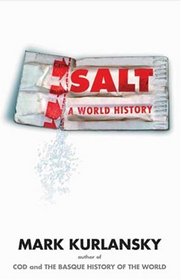Helpful Score: 2
Truly all that can be said of salt is written in these pages, however, that said it was very interesting and did hold my interest. I did learn many trivia points concerning other historical points and facts of items one would not readily attribute to salt. I would recommend reading this as a fill in while reading another book, it can be a bit much.
Helpful Score: 1
Fascinating journey through world history. You will be amazed at the importance of salt's role in world civilization. We think of it today as merely a seasoning, but its preservative and disinfectant qualities made it indispensable in days gone by. Well written.
Helpful Score: 1
Kurlansky is excellent at presenting world history from one aspect which includes all other aspects. If all history were written this way we'd all be non-fiction admirers.
Helpful Score: 1
This book is full of interesting historical notes on the culinary and other uses of salt....along with the impact of salt on the economic and social tides of many countries. The author jumps around a bit in time period and some segments of the book felt like short research papers stuck into the middle of the book. If you are interested in geography, science, culinary arts and history, you will likely enjoy this.
Helpful Score: 1
This is an absolutely fascinating history of an item that most of us take for granted without realizing its impact. It can be a bit dry in parts, but overall it's an enjoyable read.




